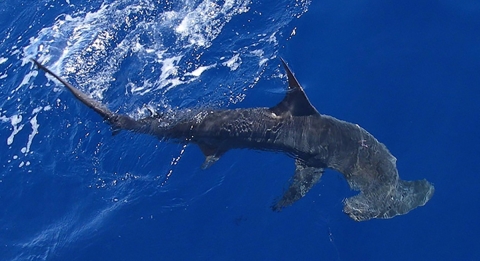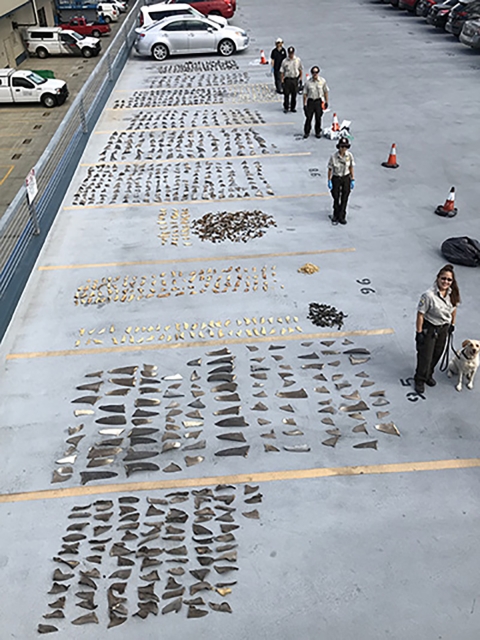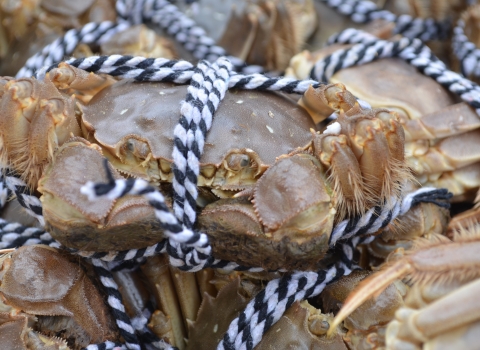Sharks have long gripped our fascination and swum in the ocean before dinosaurs roamed the earth. However, such factors as climate change climate change
Climate change includes both global warming driven by human-induced emissions of greenhouse gases and the resulting large-scale shifts in weather patterns. Though there have been previous periods of climatic change, since the mid-20th century humans have had an unprecedented impact on Earth's climate system and caused change on a global scale.
Learn more about climate change , ocean pollution, overfishing and fin poaching now leave some species of sharks facing extinction in parts of the world.
Why do we need to protect sharks?
Sharks play a crucial role in healthy ocean ecosystems because they are a top predator—they keep prey species populations at a healthy level and prevent algae overgrowth that advances the decline of coral reefs.
Some species of sharks are particularly vulnerable to overfishing because they do not populate quickly. Similar to humans, most shark species are long-lived, slow growing and take many years to reach sexual maturity. In addition, sharks give birth to few offspring at a time, have high juvenile mortality and infrequently reproduce.
As a commodity, there is a legal trade in shark products and the legal shark fishing industry provides an honest livelihood for many. Sharks are also vital to local economies through dive tourism, where humans enjoy observing and learning about these gentle giants underwater.
Why is there a shark population decline overseas?
The United States enforces a science-based fishery management approach that prevents overfishing and rebuilds stocks. However, the overfishing and illegal fishing of sharks solely for their fins is depleting some populations overseas. Most heinously, sharks are de-finned alive, known as “shark finning.” Once its fin has been cut off, the body is thrown overboard where the shark drowns while bleeding into the water, which attracts more sharks. This practice is prohibited by several international tuna treaties, U.S. federal law and under some U.S. state laws. U.S. fishermen must bring a shark to shore with all its fins naturally attached.
Shark fins are dried and then sold to make shark fin soup, and a single bowl may sell for $100 USD. Shark fin soup is considered a delicacy and is mainly served at special events, and can be found in restaurants around the world. The cartilaginous soup is made from ceratotrichia, a keratin-like substance. These long, thin filaments of protein are most prevalent in the dorsal, pectoral, and lower caudal fins; therefore, those fins are the most desirable and most often seen in the illegal trade.
International protections
Today, several shark species are internationally protected under the Convention on the International Trade in Endangered Species of Fauna and Flora (CITES), including thresher, silky, basking, great white, oceanic whitetip, porbeagle and whale sharks; three species of hammerhead sharks (scalloped, great and smooth); and short fin and long fin mako sharks. The most recent additions have been species of pelagic (open ocean) sharks. Many of these protected species have large fins that are traded internationally to meet the market demands for shark fin soup.
What is the Service doing?
As the implementing body for CITES in the U.S., the Service’s International Affairs program provides the scientific basis and oversight to ensure that international trade in plants and animals is legal and sustainable. There are currently 183 Parties to CITES, which include 182 member countries and the European Union. The sharks mentioned above are protected under CITES in a level that allows international trade as long as it is not detrimental to the survival of the species and provides that the specimens were obtained legally, without violating any state, federal or other jurisdictional law, including any measure adopted by a regional fisheries management organization.
The Service’s Office of Law Enforcement (OLE) is committed to enforcing federal laws and international treaties that protect wildlife. Thanks to laws such as the Lacey Act and Endangered Species Act, the OLE has seized approximately 35 tons of CITES-protected shark fins shipped illegally through the United States since 2016.
The Service partners with U.S. Customs and Border Protection (CBP), U.S. Coast Guard (USCG), the National Oceanic and Atmospheric Administration (NOAA), and other state and federal entities to tackle the unlawful shark trade. Interagency cooperation is essential to uncovering unpermitted, falsely labeled and concealed shipments.
CITES-protected shark fins have been found shipped illegally through air cargo, sea cargo, personal baggage and express freight. Through enhanced targeting, OLE’s wildlife inspectors and special agents have made large in-transit seizures across our country. Examples of shipments and shark species include:
Hawaii shark fin seizure. Photo by USFWS Seattle, Washington: 4 U.S. tons that contained great hammerhead and oceanic whitetip shark fins;
- Oakland, California: 27 U.S. tons that contained scalloped hammerhead, smooth hammerhead, oceanic whitetip and porbeagle shark fins;
- Memphis, Tennessee: 628 individual shark fins from species that included smooth hammerhead, great hammerhead and scalloped hammerhead fins;
- Anchorage, Alaska: 1,191 pounds that contained great hammerhead shark fins;
- Louisville, Kentucky: 110 pounds that contained silky shark and oceanic whitetip shark fins; and
- Miami, Florida: 1,394 pounds that contained great hammerhead, scalloped hammerhead, and silky shark fins.
In response to the increase of wildlife trafficking activity, OLE initiated an interdiction team that that is composed of senior wildlife inspectors whose focus is to combat wildlife trafficking by exposing criminal pathways, generate intelligence on wildlife trafficking and coordinate national inspection efforts. The Wildlife Inspection Interdiction Team is designed to be efficient, cohesive, flexible, effective, and results driven. A recent success was Operation Hidden Mitten.
“Not on our watch,” said Regional Supervisor Wildlife Inspector Eva Lara. “The OLE is focused and committed to interdict illegal shark fins from transiting through the United States. Across our nation, our wildlife inspectors are trained professionals who know what wildlife species is legal or illegal. We all work hard to conserve wildlife species that are endangered and disrupt the black-market trade.”
Conservation celebrations such as “Shark Week” provide the learning foundation to discover reasons to love sharks and not fear them. They are incredibly important to the health of our planet and the Service and our partners will continue in its efforts to ensure sharks remain on the planet so future generations may benefit from them.
By John Goldman, Wildlife Inspector, Office of Law Enforcement
This story is from our Open Spaces blog.









